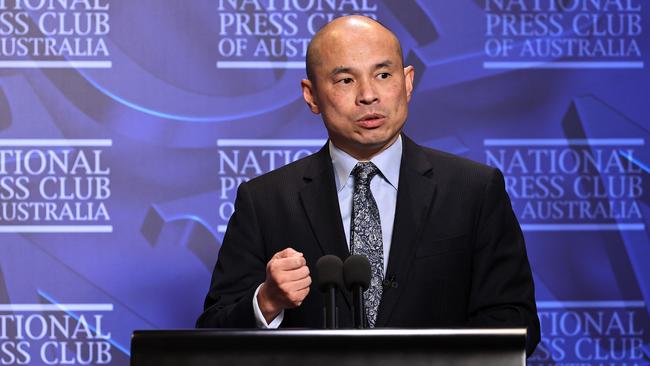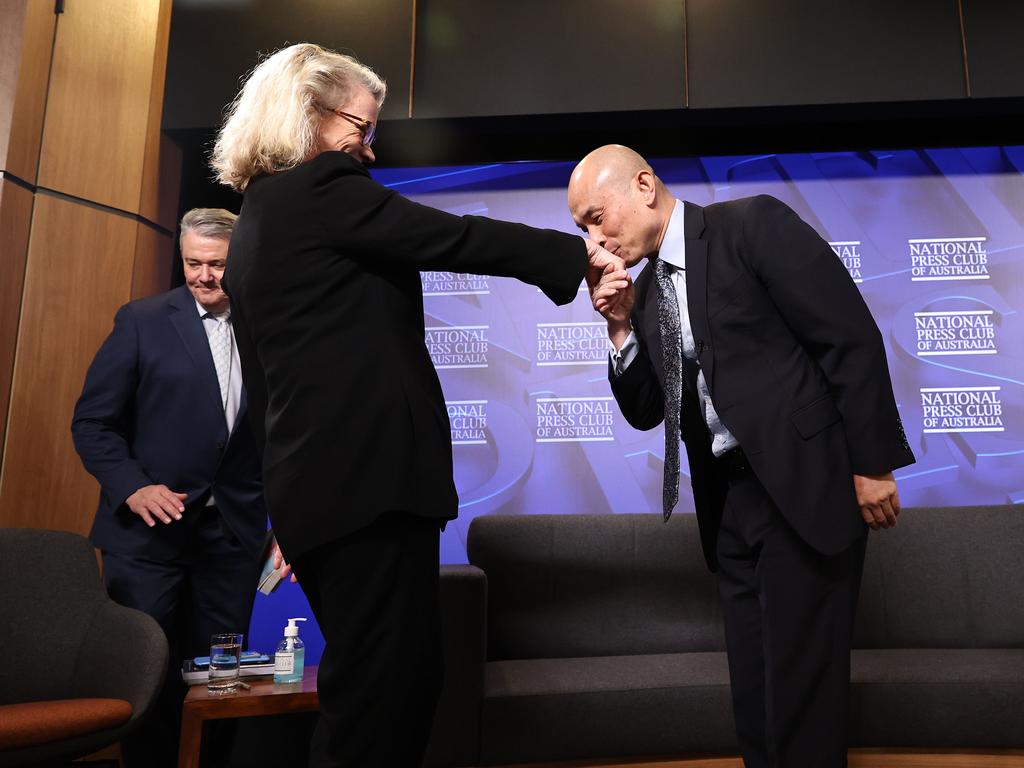
In his strongly worded comments, Wang made it clear that China was still very upset at Australia’s public move 2½ years ago to ban Huawei from supplying equipment for its 5G network rollout, but also what it saw as its urging of other countries to follow suite.
“Australia was the first to ban Huawei into domestic telecommunication-industry building and then Australia even persuaded others to follow suit,” Wang said.
“By doing so, I think Australian connived with the US in a very unethical, illegal, immoral suppression of Chinese companies.”
He said China was upset at recent moves by the Australian government to block bids by Chinese companies to buy assets in Australia.
It is now a year since Australia’s Foreign Minister, Marise Payne, called for an inquiry into the origins of the pandemic in a way that infuriated Beijing and led to threats of trade retaliation.
At the time, just before the pandemic, Australia-China trade ties were running at a near record $200bn a year, with record numbers of tourists and students and Australia the leading foreign supplier of wine to China and Chinese beer makers big users of Australian barley.
Some have described Payne’s comments as a key catalyst for sparking trade tensions with China. Since then, Australia’s exports of wine, barley, coal, lobster, timber and beef have all been hit with trade sanctions, while tourism and education revenue have been hit by border closures.
That said, there has also been a resilience in the relationship.
China remains Australia’s largest trading partner thanks to continued sales of iron ore at booming prices, and ongoing sales of LNG and other commodities.
Australian exports to China still came in at more than $145bn in 2020 (largely due to the high price of iron ore and the fact the wine tariffs were not imposed until right at the end of the year), not that much lower than the record pre-pandemic $148bn in 2019.
With Chinese tariffs now having killed Australia’s once booming $2bn-plus wine and barley trade with China, and an array of other “non-tariff” actions against other exports and regular criticism in populist Chinese media outlets such as the Global Times of Australia, those in the Australia-China trade have been watching for any more signs in the wind of which way things are going.
Have things hit rock bottom or are they going to get worse? And what does that mean for future Australia-China trade?
Is another export sector about to be hit? Some are now wondering if hay exports are in the Chinese government sights.
Wang’s fiery comments on Huawei confirm that China’s anger at Australia goes back much further than a year ago, to a long list of grievances.
Of course, China does not let foreign companies such as Google and Uber and Facebook operate on its territory, either. But it has been angry that the global progress of its leading edge telecommunications star Huawei has been stymied in some markets.
One journalist at the Press Club on Wednesday asked Wang about whether the trade tensions between Australia and China may have at least hit bottom.
But he gave little grounds for optimism in the near term.
An experienced diplomat with a strong command of English, Wang’s stinging attacks made it clear that China felt it had done nothing to hurt ties with Australia and the fault was all on Australia’s side.
“We have done nothing intentionally to hurt this relationship,” he said.
“We have seen too many incidents over the past few years that China’s interests have been hurt.”
Wang also used some colourful allegories, including one that referred to this year being the Year of the Ox.
He said the Chinese people often thought of themselves as hard-working like the oxen, “willing to share our yoke with all partners to plough through the difficulties caused by COVID-19”.
But he added: “China is not a cow. I don’t think people should fancy the idea of milking China when she’s in her prime with a plot to slaughter it in the end.
“We are open for co-operation and collaboration but we will be very strong in defending our national interest.”
It is clear that China is now using trade sanctions on goods from Australia, a small to mid-level well-connected country, to send a lesson to other countries that have also criticised its policies and taken action to constrain the expansion of Chinese companies within their borders.
China has tense relations for different reasons with Sweden, Canada and Britain to name a few. Europe is watching how Germany’s relationship with China might change with the exit of long-time China supporter Angela Merkel.
The good news on Wednesday was that Wang, who sprang to prominence in Australia early last year when he appeared on the ABC’s Q+A program, did decide to appear on the panel at the National Press Club. He got a fair hearing and time to set out his case in respectful surroundings.
As a Chinese diplomat, Wang is obliged to put the Chinese government point of view.
But in his remarks on Wednesday he also talked about the importance of ongoing people-to-people relationships with China.
He noted that the Chinese definition of the word crisis meant both peril and opportunity.
“We believe there will always be a nirvana after a major crisis,” he said.
He said China hoped to see a nirvana of the global economy, but also of the Australia-China relationship.
He also made a somewhat confusing reference to the legend of Brunhilde, a legendary figure who is also a character in Wagner’s Ring Cycle, and her jumping into the fire with Siegfried which, he says, eventually saw their relationship elevated to a new level.
“Don’t be afraid of fire and problems,” he said in what appeared to be a reference to the Australia-China relationship.
“If we handle it well, we will elevate everything to another level.”






For those hoping for an improvement in Australia’s ties with its largest trading partner, comments made by China’s deputy ambassador Wang Xining to the National Press Club in Canberra on Wednesday, accusing Australia of “unethical, illegal and immoral” action against Chinese companies such as Huawei, make it clear that things are not going to improve any time soon.